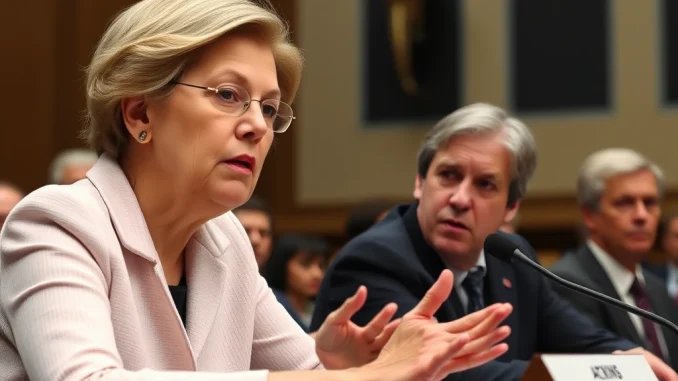
The crypto world is watching closely as political winds shift in Washington. Senator Elizabeth Warren recently put the spotlight on U.S. SEC chair nominee Paul Atkins, raising serious questions about his suitability for the role. Why is Warren so concerned, and what does this mean for the future of crypto regulation? Let’s dive into the details of this fiery Senate confirmation hearing.
Who is SEC Nominee Paul Atkins and Why is He Under Fire?
Paul Atkins, the individual nominated to potentially lead the U.S. Securities and Exchange Commission (SEC), is no stranger to the world of finance and regulation. However, his past is now under intense scrutiny, particularly from Senator Elizabeth Warren.
Warren didn’t mince words during the Senate confirmation hearing, directly confronting Atkins about his track record. Her primary concern? Atkins’ role in deregulating major banks leading up to the devastating 2008 financial crisis. She argued that his decisions back then were “deeply flawed” and contributed to the economic turmoil that followed.
But the criticism didn’t stop there. Warren also brought up another hot-button issue: Atkins’ significant financial ties to the cryptocurrency industry. This raises a crucial question: can someone with such close connections to crypto impartially regulate the very same sector?
Elizabeth Warren’s Alarming Concerns: Deregulation and Past Decisions
Senator Warren’s attack wasn’t just a political jab; it was a detailed examination of Paul Atkins’ history. She specifically highlighted his past actions that paved the way for the 2008 financial meltdown. According to U.Today, Warren pointed out that Atkins advocated for deregulation that ultimately benefited large banks but at the expense of financial stability.
Here’s a breakdown of Warren’s key points regarding Atkins’ past:
- Deregulation Advocate: Atkins has a history of supporting deregulation in the financial sector.
- Pre-2008 Crisis Role: Warren argues his policies contributed to the environment that led to the 2008 financial crisis.
- “Deeply Flawed” Decisions: Warren characterized his past decisions as fundamentally wrong and detrimental to the economy.
Warren’s line of questioning suggests a deep distrust in Atkins’ ability to learn from the past and prioritize consumer protection in his potential role as SEC chair. This historical context is vital to understanding the intensity of her opposition.
The Crypto Connection: Millions in Crypto Holdings Spark Conflict Concerns
Beyond his past regulatory stance, Warren zeroed in on a more contemporary concern: Paul Atkins’ crypto holdings. She revealed that Atkins possesses nearly $6 million invested in crypto-related assets. This revelation immediately raises red flags about potential conflicts of interest.
Why is this a big deal? Imagine the person tasked with regulating the crypto industry is heavily invested in it. Critics argue this could lead to biased decision-making, potentially favoring his own investments over objective and fair regulation. It’s a classic case of the fox guarding the henhouse, some might say.
Key points of concern regarding Atkins’ crypto ties:
- Significant Crypto Investments: Nearly $6 million in crypto assets.
- Potential Conflict of Interest: His financial stake could influence regulatory decisions.
- Ethical Questions: Can he impartially regulate an industry he is financially invested in?
Crypto Regulation as a Top Priority: Atkins’ Stance
Despite the barrage of criticism, SEC Nominee Paul Atkins remains the likely candidate to be confirmed as SEC chair. Adding fuel to the fire, Atkins himself has stated that crypto regulation will be a “top priority” if he is appointed. This declaration is both reassuring and concerning, depending on your perspective.
On one hand, it signals that the SEC, under Atkins, will likely address the pressing need for clear crypto rules. The industry has been clamoring for regulatory clarity for years, and Atkins’ statement suggests this might finally be on the horizon. On the other hand, given Warren’s concerns and Atkins’ pro-deregulation background, there’s anxiety about *what kind* of regulation he might implement.
Will it be regulation that fosters innovation and protects consumers, or will it be regulation that stifles the industry or favors established financial institutions? This remains the million-dollar question.
What Does This Mean for the Future of Crypto?
The confirmation of Paul Atkins and his approach to crypto regulation could significantly shape the future of the digital asset space in the U.S. Here’s what to watch out for:
- Increased Regulatory Scrutiny: Atkins’ focus on crypto regulation suggests heightened attention from the SEC.
- Potential for Clearer Rules: The industry may finally get the clarity it needs to operate within defined boundaries.
- Risk of Stifling Innovation: Depending on the nature of regulation, there’s a risk of hindering crypto innovation if rules are too restrictive.
- Focus on Investor Protection: Regulation could prioritize investor protection, potentially leading to stricter compliance requirements for crypto companies.
The coming months will be crucial in observing how Atkins navigates the complex landscape of crypto regulation. Will he address Warren’s concerns and prioritize investor protection, or will his regulatory approach lean towards deregulation, potentially repeating past mistakes? The crypto community, and indeed the entire financial world, will be watching closely.
Conclusion: A Critical Juncture for Crypto Regulation
Senator Warren’s grilling of SEC Nominee Paul Atkins has thrown the spotlight on a critical moment for crypto regulation in the United States. The concerns raised about his past record and potential conflicts of interest are significant and warrant close attention. While Atkins’ confirmation seems likely, the debate sparked by Warren highlights the ongoing tension between fostering innovation in the crypto space and ensuring robust consumer protection and financial stability. The decisions made by the SEC under its new leadership will undoubtedly have a profound and lasting impact on the future trajectory of the cryptocurrency industry.



